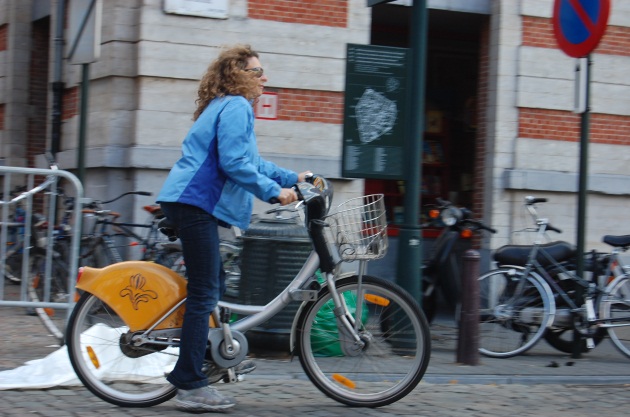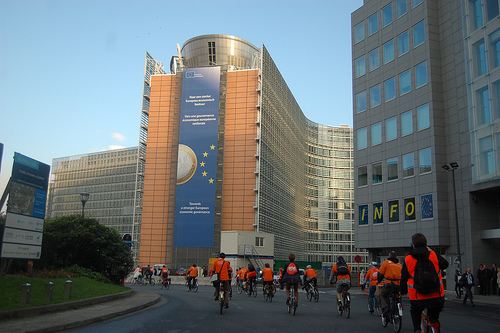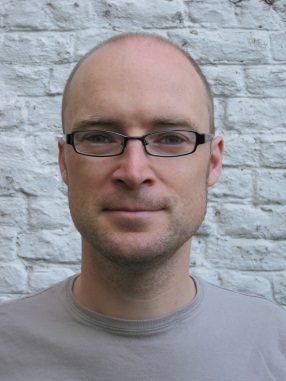
In the Bicycle Seat with Lewis Dijkstra: Have the EU institutions Made Brussels More Bicycle Friendly?
Having been awarded the title for the most congested city in Europe in 2011, Brussels has a long way to go before it joins ranks with neighboring cycling cities in Flanders and the Netherlands. Lewis Dijkstra, President of the European Union Cyclists' Group (EUCG), gives us the run down on Brussels, cycling and the role of the EU institutions in promoting change in a largely car-centric city.
Q: Has bike-sharing had a positive influence on the image of cycling in Brussels?
A: I think the new bicycle renting system provides a simple and cheap way to try riding a bike in Brussels and can be very useful for short occasional trips. It is open to both residents and visitors and I think it is quite popular. I have tried the system here in Brussels and also in Paris and enjoyed it. I believe it does promote a more positive image of cycling and allows more people to ride a bicycle occasionally. People who enjoyed riding these bicycles may decide to start riding their own bicycle more frequently.
Q: Brussels was recently ranked as the most congested city in Europe? Does one have to be courageous to tackle the roads on two wheels?
A: I think we all suffer from congestion. The noise, the pollution and the wasted time makes it for me hard to understand why this problem is not properly addressed. Brussels is not a very pleasant city to ride a bicycle in. The air quality is often poor, congestion is high, many drivers are not used to cyclists and the cycling infrastructure is insufficient and still too often poorly designed and connected.
Nevertheless, I enjoy riding my bicycle in Brussels. I try to avoid the major thoroughfares which are loud and polluted and ride down small and quiet streets. I ride defensively and assume that drivers do not see and will turn without signaling; which all too often turns out to be a correct assumption.
With a little bit of training and practice, cycling can be incredibly enjoyable and rewarding. For example, many of the people who have tried cycling to work with a bike mate have continued to ride. But to make Brussels truly bicycle friendly, many policies will have to change.
Q: On a policy level, what has Brussels been doing to improve its bicycle credentials?
A: Brussels used to be a bicycle desert. As a student in Brussels during the early nineties, I had the impression that I could count the regular cyclists in Brussels on one hand. The number of cyclists has increased a lot over those twenty years.
The Brussels region and the 19 communes now do think of bicycles more often than in the past and some bicycle friendly policies have been put in place. But progress overall is quite discouraging, scattered and uneven. The regional cycle network is a perfect example of a basically good plan that got lost in administrative inertia and the political fragmentation of Brussels. Some communes support the network, while others ignore them.
Bicycle parking has improved, but only at popular destinations. Providing a safe and convenient place for people to park their bicycle outside their flat or small house should be promoted.
Q: How does Brussels rate in terms of cycling compared to its nearby neighbors, e.g. London or Paris?
A: One can compare Brussels to London and Paris, but both these cities are much, much larger. One could also compare it toAmsterdam, Antwerp or Aachen. Unfortunately, the conclusion remains the same. Brussels is not doing enough and what it does is uncoordinated and fragmented. As a result, traffic is worse than it needs to be, cycling is less prevalent and less attractive that it should be and we all suffer the noise, pollution and frustration of a terribly inefficient transport system.
It is no surprise that the European Commission has criticized Brussels for flouting the air quality directive. Instead of taking the health of its inhabitants and visitors seriously, the proposal is to enlarge the ring road. A congestion charge has been postponed indefinitely. There is no political will to address the abundance of company cars which completely eliminate all financial incentives not to drive to work. The bicycle compensation scheme of a few euro cents a km is based on the wrong principle and provides only a minimal financial benefit compared to a company car.
The EUCG has argued that employers should not discriminate between different modes of transport or the distance to work. People choose where to live and how to come to work. Paying employees who drive longer distances more or providing car drivers with free parking is basically unfair and bad for the environment. People who live in Brussels and walk, cycle or take public transport to work face substantially higher housing costs than people who drive into Brussels. Also living close to a public transport line is more expensive. So there is no justification to spend more on car drivers. They do not necessarily work harder nor do they face higher costs, once you take into account their lower housing costs.
Parking policy in Brussels is currently not particularly effective. A simple system of concentric circles with high charges in the centre and lower charges further from the centre combined with an effective and transparent enforcement mechanism as is the case in Amsterdam would make life easier for everybody including the drivers. Maybe with the move of mobility and parking policy to the region will we see such a system emerge, but resistance to such a plan may still be high.
Q: Do you think the presence of European Institutions has had a positive influence on cycling Brussels, if any influence at all?
A: The staff of European Institutions are not necessarily seen very favorably in Belgium. There are many stereotypes abound of Eurocrats who live in a little expat world and complain about Belgium. The access to the Berlaymont underground parking from the tunnels is often used as a symbol of how little interaction European staff wants with Brussels.
The reality is fortunately much more positive. I think the European institutions have brought together a mix of motivated and committed individuals who want to improve not just the EU but also the environment they live in. I know many colleagues who are active in local NGOs and ‘comités de quartier’, who donate time and money to improve life in Brussels and participate actively in all the social and cultural activities Brussels has to offer.
The impact of European institutions on cycling in Brussels is maybe not so easy to see, but many of the EU civil servants come from countries with a much stronger daily cycling culture than Belgium, think of Germany, the UK, Denmark and of course the Netherlands. They bring this culture and this practice with them. The European Union Cyclists Group reflects that too. It is the largest cycling organization in Brussels with more than 1300 members. I would not be surprised if the European Institutions have the highest share of bicycle commuting of any large employer in Brussels.
My goal as the new president of the EUCG is to work more closely with the Fietsersbond and GRACQ. I hope we can agree a short list of clear priorities for cyclists in Brussels and start a discussion with the region and the 19 communes of how these priorities can be implemented.
Lewis Dijkstra is the president of the European Union Cyclists' Group (EUCG), which encourages the daily use of bicycles by all staff of the Institutions of the European Union in Brussels and has over 1300 members. He holds a PhD in Urban and Regional Planning from Rutgers University, NJ. He has published several articles on bicycle safety with John Pucher and drafted a bicycle plan for Jersey City. He has been working for the European Commission for ten years. He currently is the deputy head of the Analysis unit in the Directorate-General for Regional Policy, where is responible for the Cohesion and Progress Reports. These reports cover a wide range of issues at the regional and urban level, including transport and traffic safety.
Contact the author
Recent news!
Upcoming events
Contact Us
Avenue des Arts, 7-8
Postal address: Rue de la Charité, 22
1210 Brussels, Belgium













